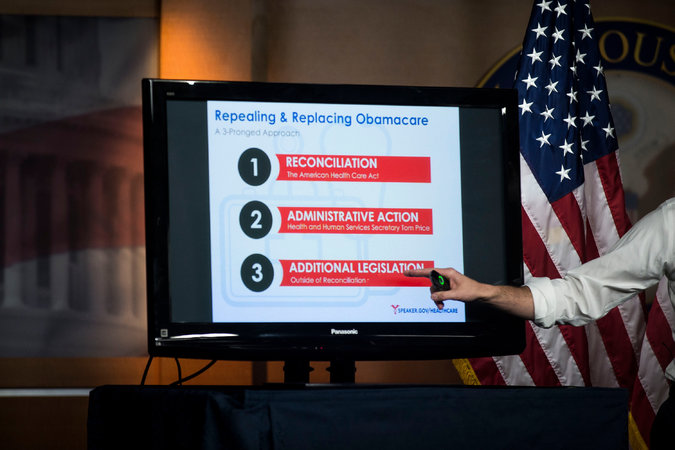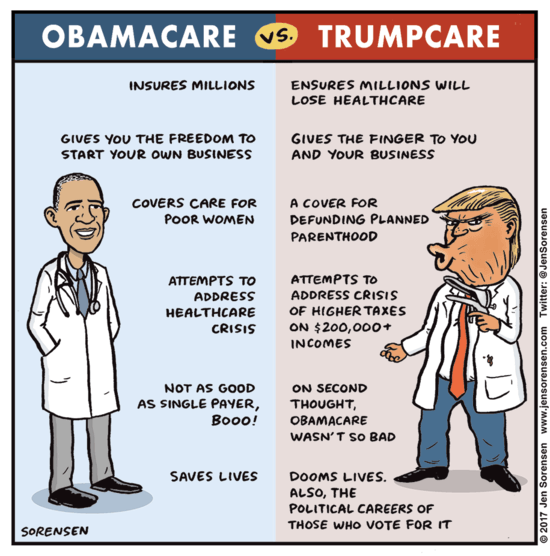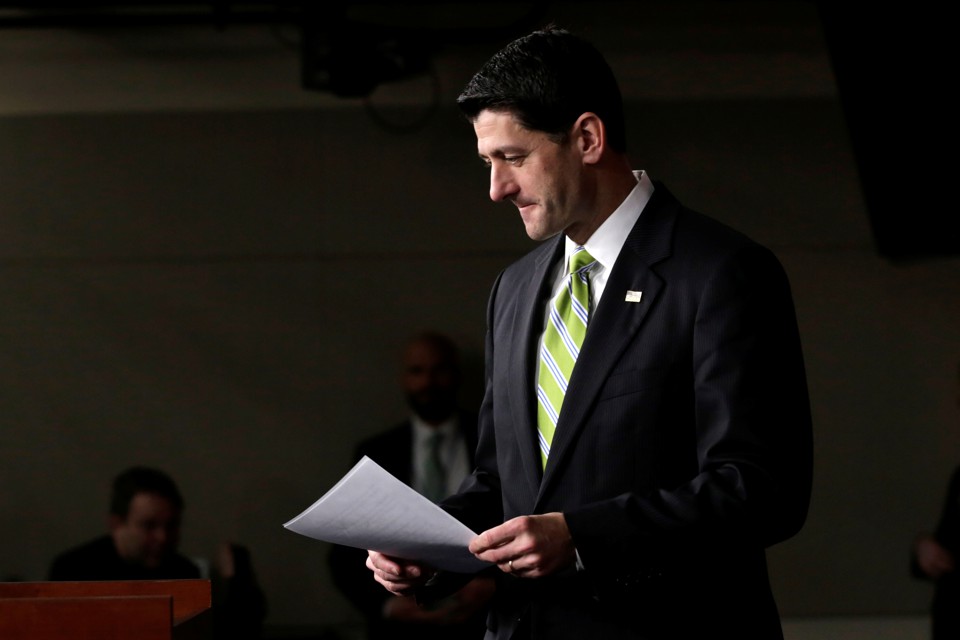House Republicans release long-awaited
plan to repeal and replace Obamacare
http://wapo.st/2lPAw7APlay Video2:30
President Trump, Vice President Pence and House Speaker Paul Ryan (R-Wis.) keep saying a plan to repeal and replace Obamacare will be released soon, but few details have been released so far.
House Republicans on Monday released long-anticipated legislation to supplant the Affordable Care Act with a more conservative vision for the nation’s health care system, replacing federal insurance subsidies with a new form of individual tax credits and grants to help states shape their own policies.
The legislation would preserve two of the most popular features of the 2010 health-care law:
Letting young adults stay on their parents’ health plans until age 26 and forbidding insurers to deny coverage or charge more to people with preexisting medical problems.
It would also target Planned Parenthood, rendering the women’s health organization ineligible for Medicaid reimbursements or federal family planning grants — a key priority for antiabortion groups.
Taken together, the bills introduced Monday night represent the Republicans’ first attempt — and best shot to date, with an ally in the White House — to translate seven years of talking points about demolishing the ACA into action.
At the same time, major aspects of the plans, notably the strategy for tax credits and Medicaid, reflect the treacherous terrain that Republicans face to win enough votes within their own conferences in the GOP-controlled House and Senate.
The bills must address concerns of both conservatives worried about the cost of the overhaul and worries that it might in effect enshrine a new federal entitlement, as well as more moderate members who want to ensure that their constituents retain access to affordable health care, including those who received Medicaid coverage under the ACA.
Even so, signs emerged on Monday that Republicans in Congress’s upper chamber could balk either at the cost of the proposal or if it leaves swaths of the country without insurance coverage.
Sen. Rand Paul (R-Ky.) one of at least three conservative senators who opposes the plan to provide income-based tax credits, tweeted: “Still have not seen an official version of the House Obamacare replacement bill, but from media reports this sure looks like Obamacare Lite!”
And four key Republican senators, all from states that opted to expand Medicaid under the ACA, said they would oppose any new plan that would leave millions of Americans uninsured.
Democrats, meanwhile, have given no indication that they intend to work with Republicans, and top party leaders decried the GOP plan Monday as a betrayal of everyday Americans. “Trumpcare doesn’t replace the Affordable Care Act, it forces millions of Americans to pay more for less care,” said Senate Minority Leader Charles E. Schumer (D-N.Y.).
The tax credits outlined by the Ways and Means Committee’s portion of the legislation incorporate an approach that Republicans have long criticized: income-based aid to help Americans afford health coverage.
While the number of Americans who can afford health insurance has never been the priority for the GOP that it is for Democrats, President Trump has made clear that he is sensitive to any changes that would strand large numbers of people who gained coverage under the ACA.
[Conservative groups and lawmakers demanding ‘full repeal’ could derail Obamacare rollback]
Compared with the ACA’s subsidies, the tax credits would go to more people but provide less financial help to lower-income people, according to Larry Levitt, senior vice president of the Kaiser Family Foundation.
Meanwhile, the portion of the legislation drafted by the Energy and Commerce Committee would substantially redesign Medicaid in a way that attempts to balance the GOP’s antipathy toward the ACA’s expansion of the program against the concerns of a significant cadre of Republican governors — and the lawmakers from their states — who fear losing millions of dollars that the law has funneled to help insure low-income residents.
Medicaid would be converted from its current form of entitlement to anyone eligible into a per capita cap on funding to states, depending on how many people they had enrolled. In states that expanded Medicaid under the ACA, the government for now would continue paying for virtually the entire cost of the expansion.
SOURCE: https://www.washingtonpost.com/powe...22680e18d10_story.html?utm_term=.480523b8b71a
.
plan to repeal and replace Obamacare
http://wapo.st/2lPAw7APlay Video2:30
President Trump, Vice President Pence and House Speaker Paul Ryan (R-Wis.) keep saying a plan to repeal and replace Obamacare will be released soon, but few details have been released so far.
House Republicans on Monday released long-anticipated legislation to supplant the Affordable Care Act with a more conservative vision for the nation’s health care system, replacing federal insurance subsidies with a new form of individual tax credits and grants to help states shape their own policies.
The legislation would preserve two of the most popular features of the 2010 health-care law:
Letting young adults stay on their parents’ health plans until age 26 and forbidding insurers to deny coverage or charge more to people with preexisting medical problems.
It would also target Planned Parenthood, rendering the women’s health organization ineligible for Medicaid reimbursements or federal family planning grants — a key priority for antiabortion groups.
Taken together, the bills introduced Monday night represent the Republicans’ first attempt — and best shot to date, with an ally in the White House — to translate seven years of talking points about demolishing the ACA into action.
At the same time, major aspects of the plans, notably the strategy for tax credits and Medicaid, reflect the treacherous terrain that Republicans face to win enough votes within their own conferences in the GOP-controlled House and Senate.
The bills must address concerns of both conservatives worried about the cost of the overhaul and worries that it might in effect enshrine a new federal entitlement, as well as more moderate members who want to ensure that their constituents retain access to affordable health care, including those who received Medicaid coverage under the ACA.
Even so, signs emerged on Monday that Republicans in Congress’s upper chamber could balk either at the cost of the proposal or if it leaves swaths of the country without insurance coverage.
Sen. Rand Paul (R-Ky.) one of at least three conservative senators who opposes the plan to provide income-based tax credits, tweeted: “Still have not seen an official version of the House Obamacare replacement bill, but from media reports this sure looks like Obamacare Lite!”
And four key Republican senators, all from states that opted to expand Medicaid under the ACA, said they would oppose any new plan that would leave millions of Americans uninsured.
“We will not support a plan that does not include stability for Medicaid expansion populations or flexibility for states,” Sens. Rob Portman (Ohio), Shelley Moore Capito (W.Va.), Cory Gardner (Colo.) and Lisa Murkowski (Alaska) wrote in a letter to Senate Majority Leader Mitch McConnell (R-Ky.).
The four senators were split on exactly what proposals would meet their standards, but with 52 Republicans, McConnell would not have enough votes to pass repeal without the support of at least two of them.
The four senators were split on exactly what proposals would meet their standards, but with 52 Republicans, McConnell would not have enough votes to pass repeal without the support of at least two of them.
Democrats, meanwhile, have given no indication that they intend to work with Republicans, and top party leaders decried the GOP plan Monday as a betrayal of everyday Americans. “Trumpcare doesn’t replace the Affordable Care Act, it forces millions of Americans to pay more for less care,” said Senate Minority Leader Charles E. Schumer (D-N.Y.).
In particular, the plan to target Planned Parenthood has already generated fierce pushback from Democrats and doubts from some Republicans who have noted that federal funds are already barred from funding abortions and that Planned Parenthood provides routine medical care to millions of American women.
There is no precedent for Congress to reverse a major program of social benefits once it has taken effect and reached millions of Americans.
There is no precedent for Congress to reverse a major program of social benefits once it has taken effect and reached millions of Americans.
Until now, the GOP had been intending to veer away from the ACA subsidies that help poor and middle-class people obtain insurance, insisting that the size of tax credits with which they planned to replace the subsidies should be based entirely on people’s ages and not their incomes. But the drafts issued Monday proposed refundable tax credits that would hinge on earnings as well as age — providing bigger credits for older and poorer Americans.
This big pivot, developed by the Ways and Means Committee under the guidance of House Speaker Paul D. Ryan (R-Wis.), stems from a combination of problems that were arising with the idea of age-only credits that would have been available to any individual or family buying insurance on their own, no matter how affluent.
The Republican plan would offer tax credits ranging from $2,000 per year for those under 30 to $4,000 per year for those over 60. The full credit would be available for individuals earning up to $75,000 a year and up to $150,000 for married couples filing jointly. The credits would phase out for individuals earning more — for each $1,000 in additional income, a person would be entitled to $100 less in credit, meaning a 61-year old could make up to $115,100 and still receive some credit.
This big pivot, developed by the Ways and Means Committee under the guidance of House Speaker Paul D. Ryan (R-Wis.), stems from a combination of problems that were arising with the idea of age-only credits that would have been available to any individual or family buying insurance on their own, no matter how affluent.
The Republican plan would offer tax credits ranging from $2,000 per year for those under 30 to $4,000 per year for those over 60. The full credit would be available for individuals earning up to $75,000 a year and up to $150,000 for married couples filing jointly. The credits would phase out for individuals earning more — for each $1,000 in additional income, a person would be entitled to $100 less in credit, meaning a 61-year old could make up to $115,100 and still receive some credit.
The income-based phaseout of the credit allows the GOP plan to be funded without taxes on employer-provided insurance that had been considered earlier in the drafting process. In addition, the latest proposal would delay the ACA’s “Cadillac” tax, a levy on the most generous employer-provided health plans, until 2025. It also retains the tax exclusion for premiums paid for employer-provided health plans.
Estimates from congressional budget analysts and the White House’s Office of Management and Budget kept showing that the credits would be both too small to provide enough help to lower-income people and too expensive overall for a GOP determined to slash federal spending that the ACA has required.
Those analysts have not had time to assess how this new configuration would affect federal spending or the number of people with insurance coverage.
Those analysts have not had time to assess how this new configuration would affect federal spending or the number of people with insurance coverage.
[Conservative groups and lawmakers demanding ‘full repeal’ could derail Obamacare rollback]
Compared with the ACA’s subsidies, the tax credits would go to more people but provide less financial help to lower-income people, according to Larry Levitt, senior vice president of the Kaiser Family Foundation.
Meanwhile, the portion of the legislation drafted by the Energy and Commerce Committee would substantially redesign Medicaid in a way that attempts to balance the GOP’s antipathy toward the ACA’s expansion of the program against the concerns of a significant cadre of Republican governors — and the lawmakers from their states — who fear losing millions of dollars that the law has funneled to help insure low-income residents.
Medicaid would be converted from its current form of entitlement to anyone eligible into a per capita cap on funding to states, depending on how many people they had enrolled. In states that expanded Medicaid under the ACA, the government for now would continue paying for virtually the entire cost of the expansion.
SOURCE: https://www.washingtonpost.com/powe...22680e18d10_story.html?utm_term=.480523b8b71a
.









































